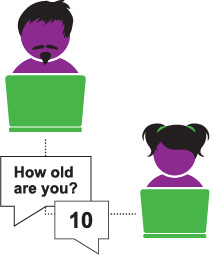Online grooming is when an adult contacts a child online, with the plan to sexually abuse them. This person is called an online sex offender.
Some offenders may develop a friendship with the child by pretending to be another young person. However, many are honest about being an adult. They may try to:
- make the child feel like their relationship with them is acceptable, normal or special
- convince the child that a sexual relationship with them is normal.
The offender may slowly build the friendship before introducing sexual ideas. They might do this through sharing explicit content or asking the child to have sex with them.

Online sex offenders are often very skilled at manipulating children and young people and may groom multiple children at the same time.
There are certain stereotypes attached to online sex offenders, however, these offenders can be anyone.
The increase in apps with direct message or ‘chat’ functions mean that anyone, anywhere can start up a conversation and pretend to be someone they’re not. Many apps don’t ask for identification when you sign up, so people can use fake names or ages to start an account – you might never really know who you are talking to.
If you think a child you know is being groomed – trust your instincts and tell someone. It is never too late to report your suspicions. The sooner online grooming is identified, the less harm may be done.
Learn how to block and report people online so you can take quick action if someone makes you uncomfortable.
You can also find support or counselling services in your village or community to help you.
Top tips
- Only talk to people on the internet that you know and trust.
- If you are talking to a stranger on the internet, including in chatrooms, avoid sharing personal information and keep discussion topics general.
- Never send photos to someone that you don’t know or trust.
- We encourage parents to be aware of their child’s use of chatrooms and who they might be talking to.
- Children should never meet up with someone who they’ve met online.